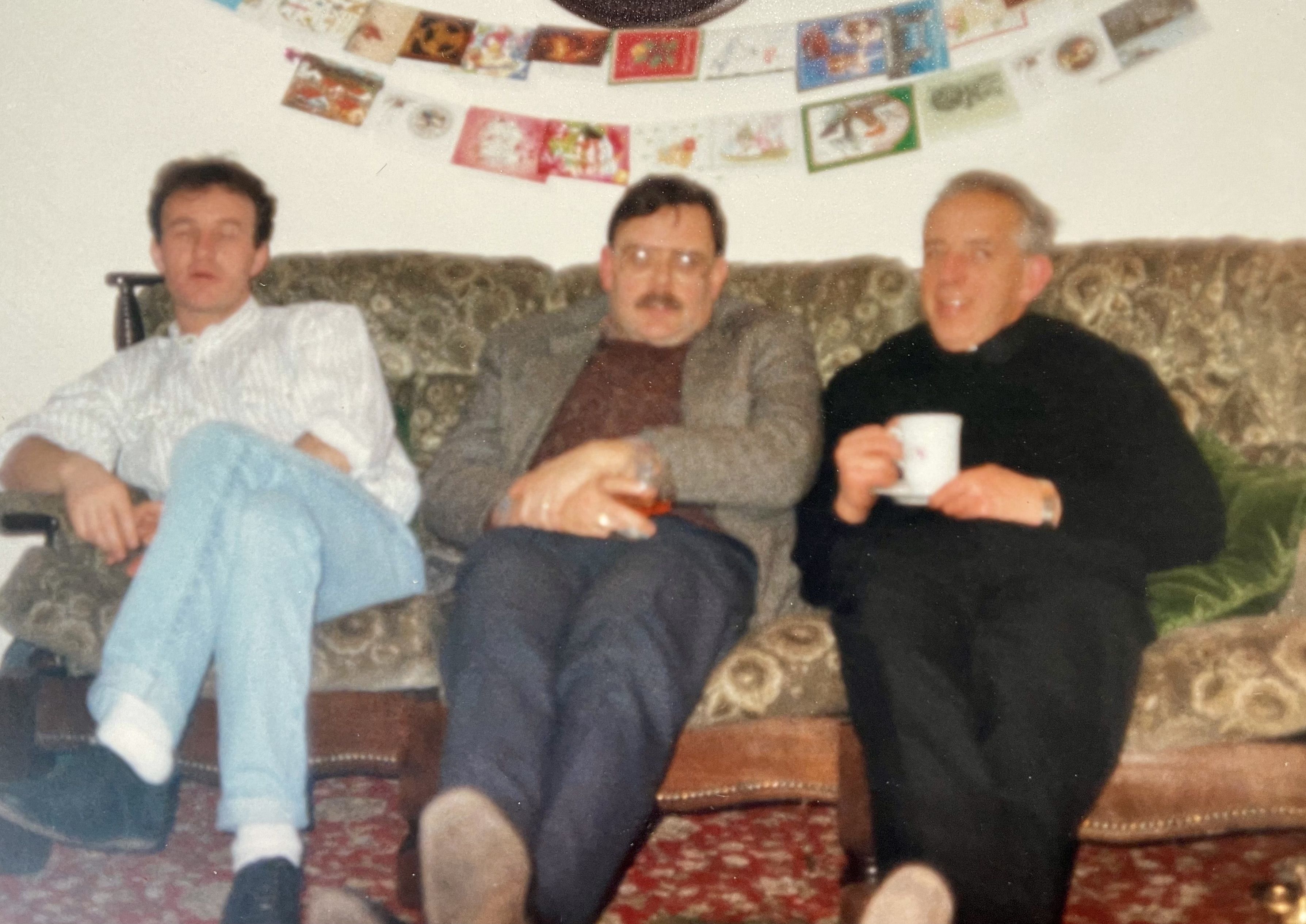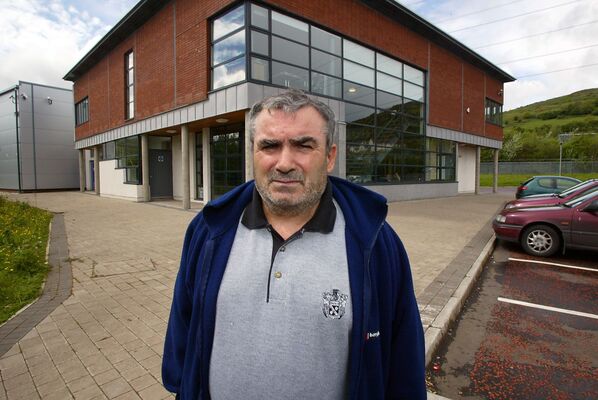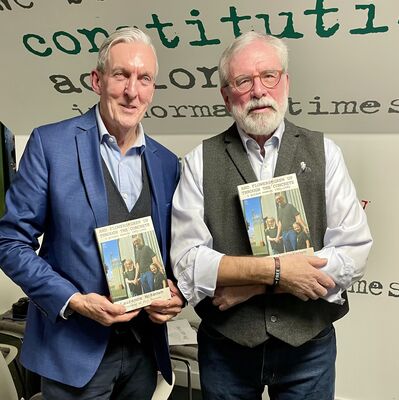NEXT Wednesday – November 22 – will mark the tenth anniversary of the death of Father Alec Reid. It is a matter of wonderment that a decade has passed since he left us. Students of the Irish peace process will know that Alec was a central figure in our search for peace. He and Fr Des Wilson were key to the beginning of that process. I won’t deal in this column with all the twists and turns of those times or the stubborn refusal for decades of the establishments, British and Irish, to embrace dialogue. Fr Alec and Des helped to change that. And much more.
Alec was an innovator and in many ways a free spirit. He was a priest, so he believed in God, but his God was not a distant supreme force. His God was in everyone and Alec believed that everyone deserved to be treated properly. In his view the work of God – and therefore the work of the priest – was to be among people upholding their rights. Fr Alec’s work with the Traveller Community in Belfast was a great example of this.
He was a friend to people like the Traveller families who were victimised. He also believed that ‘ordinary’ people had a great wealth of goodness, wisdom and experience. Especially women. He developed this thinking and formed a view that the Church’s attitude to women was wrong.
He believed the Holy Spirit works in us all. “Do your best and don’t blame yourself. It will work out if you give it 100 per cent. It’s over then to the Holy Spirit.” Having said that, he was like a terrier, never giving up. He found ways to engage with people in powerful positions from Taoisigh, ambassadors, senior government and political leaders. His work with John Hume was central to all that followed.
He was also personally brave. His presence on the streets in very dangerous times, especially during the Battle of the Funerals in the mid- and late-80s, is proof of that. Photos of tough interactions between family, neighbours and comrades of republican dead and the RUC and the British Army, when the Church hierarchy sided with the oppressors, often feature Fr Alec in the midst of the throng trying to calm things down.
His main peace-making principles are based on the dignity of the human being and the right of everyone to be treated properly and with respect – do unto others as you would have them do unto yourself. And the primacy of dialogue. He was a good listener. And always willing to reach out for advice from whoever he thought might be of help. He also understood his role, especially the role of a go-between. Many others have made a mess of this by exaggerating their own role or the positions of those they engage with. Their intentions were usually good intentions but there are lots of do-gooders who made matters worse and wasted people's time. Fr Alec kept everything tight and straight in his role as go-between, even though his work was not confined to this.
He had a good sense of humour. He liked people. He enjoyed company, particularly the relationships he built with working people including working class loyalists and republicans. He loved Gaelic games, especially hurling. He liked being out and about. He and I used to walk together when his health allowed him. His roots were in Tipperary – he played minor hurling there but he supported Dublin as well in the football. The Rice brothers of Éire Óg were often called upon to get him Croke Park tickets. He used to come to our house on Christmas Eve to enjoy the craic and banter with our other festive visitors. He and Colette were good friends.
He was very respectful about his fellow priests although he skirted around them if they were slow or reluctant or disapproving of his work. “Fr X is too holy," he remarked to me one day by way of explanation of the perceived shortcomings of a brother priest
He could also be very impatient at the ‘great and the good’ and angry at their double standards. He was very influenced by Fr Des Wilson. Alec probably would not have survived as a diocesan priest. The Redemptorists gave him space and ‘protection’ to do his work. He tried to institutionalise this within the Order, particularly in Clonard. So he was aware of the need to structure his work and for the Church leadership to face up to its responsibilities to fulfil its mission by dealing with issues of justice, equality and rights. He became very aware of the shortcomings of the Church and of its controlling nature and its leadership’s subservient relationship with – and as part of – the establishment.
He was proud to be a priest. The scandals of child abuse wounded him greatly. He told me he missed not being able to be in the company of children or to give a child a hug because of how that might be misconstrued. But he always wore his clerical collar publicly in defiance during those difficult times for good priests.
In our troubled world today his peace-making principles remain totally relevant. For sure we would not have developed our peace process when we did without Father Alec.
Go ndeanfaidh Dia trocaire air.
Making magic at the Ard Fheis
THERE have been Sinn Féin Ard Fheiseanna that have had their special, magical moment that remains in the memory years – even decades – later. Last weekend’s Ard Fheis in Athlone produced two such moments. The first came just before 1pm on Saturday. Matt Carthy TD – the party’s spokesperson on Foreign Affairs – introduced the Palestinian Ambassador, Dr Jilan Wahba Abdalmajid.
At the end of his remarks, in which he excoriated Israel for its countless breaches of international law, brutal acts of oppression, annexation, apartheid and ethnic cleansing, Matt loudly chanted: “In our thousands and in our millions, we are all Palestinians." As he repeated this a second time it was taken up by the hall. By the third time everyone was applauding and shouting: “In our thousands and in our millions, we are all Palestinians.” For an amazing moment the Ard Fheis was the heart and soul of Ireland, reaching into Gaza and the West Bank as we all welcomed the Ambassador.
It’s great to be in beautiful Athlone for the beginning of the Sinn Féin Ard Fhéis.
— Michelle O’Neill (@moneillsf) November 10, 2023
Across the island Sinn Féin is leading real, positive and transformative change, that prioritises the needs and aspirations of workers, families and local communities.
I am determined to play my… pic.twitter.com/TBDttvracj
Later, Mary Lou gave one of the best ever Presidential speeches. With four major elections likely this year she proclaimed: “We want to build a new Ireland. A nation home for all. A unified nation of confidence and compassion, talent and ingenuity, claiming our future, our rightful place among the nations of the world. The Orange and Green reconciled. No place for racism, Islamophobia, antisemitism, sexism, homophobia, transphobia, or sectarianism. Where there is no them – only us. All of us who call Ireland home.”
Mary Lou also spoke about the Israeli state’s genocide of Palestinians.
“The Palestinian people have a right to their homeland,” she said. "...the Irish Government should take the lead and refer Israel to the International Criminal Court. And send the Israeli Ambassador home... Israel must stop its slaughter in Gaza. Hamas must release all hostages. Ceasefires must be called."
In a speech that was riveting, confident and empowering, Mary Lou spoke of the need for change and of transforming Ireland to resolve the housing crisis, resourcing health, tackling the climate crisis, and much more. She called on the Irish Government to establish a Citizens’ Assembly on unity.
Gerry Adams with the Palestinian Ambassador
And at a time when some British and unionist politicians are trying to rewrite the terms of the unity referendum in the Good Friday Agreement, Mary Lou said: “The day is coming when everyone on this island will have their say in referendums. Each vote counting equally, no vetoes, no shifting of the goal posts. Irish unity is the very best opportunity for the future. In the words of Rita O’Hare: “We must keep going. A united Ireland lies ahead”.
Another magical moment.








